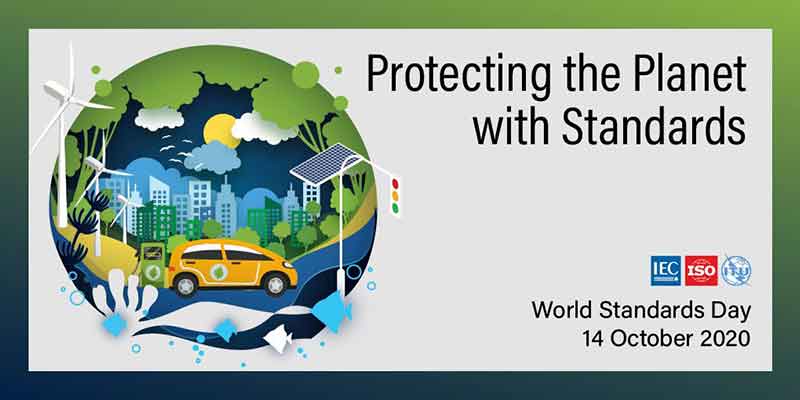- World
- Oct 14
Explainer / World Standards Day
The members of the International Electrotechnical Commission (IEC), International Organisation for Standardisation (ISO) and International Telecommunication Union (ITU) celebrate World Standards Day on October 14 every year.
The Day honours collaborative efforts of thousands of experts worldwide who develop the voluntary technical agreements that are published as International Standards.
International Standards bring technological, economic and societal benefits. They help to harmonise technical and other specifications of products and services making industry more efficient and breaking down barriers to international trade. Conformity to International Standards helps reassure consumers that products are safe, efficient and good for the environment.
The theme for World Standards Day 2020 is ‘Protecting the planet with standards’.
International Electrotechnical Commission
Founded in 1906, the IEC (International Electrotechnical Commission) is the world’s leading organisation for the preparation and publication of International Standards for all electrical, electronic and related technologies. These are known collectively as “electrotechnology”.
IEC provides a platform to companies, industries and governments for meeting, discussing and developing the International Standards they require.
Close to 20,000 experts from industry, commerce, government, test and research labs, academia and consumer groups participate in IEC standardisation work.
Its headquarters is situated in Geneva.
International Organization for Standardisation
International Organization for Standardisation (ISO) is an independent, non-governmental international organisation with a membership of 165 national standards bodies. Through its members, it brings together experts to share knowledge and develop voluntary, consensus-based, market relevant International Standards that support innovation and provide solutions to global challenges.
It was founded in 1947, and since then has published 23,429 International Standards covering almost all aspects of technology and business.
Its headquarters is situated in Geneva. The General Assembly is the overarching organ and ultimate authority of the organisation. The ISO Council is the core governance body of the organisation and reports to the General Assembly.
International Telecommunication Union
ITU is the United Nations specialised agency for information and communication technologies – ICTs.
It was founded in 1865 as the International Telegraph Union.
ITU is the inter-governmental body responsible for coordinating the shared global use of the radio spectrum, promoting international cooperation in assigning satellite orbits, improving communication infrastructure in the developing world, and establishing the worldwide standards that foster seamless interconnection of a vast range of communications systems.
ITU’s global membership includes 193 Member States as well as some 900 companies, universities, and international and regional organisations.
Its headquarters is situated in Geneva.
India has been a member of ITU since 1869.
Bureau of Indian Standards
Bureau of Indian Standards (BIS) was established in 1986 assuming the functions of the erstwhile Indian Standards Institution (ISI).
In its capacity as the National Standards Body of India, BIS is actively involved in matters of international and regional standardisation.
India has been actively involved in the matters of international standardisation and was one of the founding members of International Organization for Standardization (ISO).
BIS is a member of the International Electrotechnical Commission (IEC) and regional standards bodies like Pacific Area Standards Congress (PASC) and South Asian Regional Standards Organization (SARSO).
BIS operates under the framework of the BIS Act of 2016 and the Rules and Regulations framed thereunder.
Objectives of BIS:
• Harmonious development of the activities of standardisation, marking and quality certification of goods.
• Provide thrust to standardisation and quality control for growth, and development of industry on one hand, and to meet the needs of consumers on the other.
Its headquarters is situated in New Delhi. It has five regional offices located at Kolkata, Chennai, Mumbai, Chandigarh and Delhi. There are 32 branch offices.
BIS develops Indian Standards through a consultative mechanism in technical committees comprising stakeholders so that views and interests of all are given due consideration while formulating a standard.
During 2018-19, BIS published 1,796 standards (980 new and 816 revised) and 154 amendments. The total number of standards in force as on March 31, 2019 was 20,227.
BIS operates a Product Certification Scheme. The presence of Standard Mark (popularly known as ISI mark) on a product indicates its conformity to the relevant Indian Standard. Before granting a licence to any manufacturer, BIS ascertains the availability of required infrastructure and capability of the manufacturer to produce and test the product conforming to the relevant Indian Standard.
Manorama Yearbook app is now available on Google Play Store and iOS App Store

